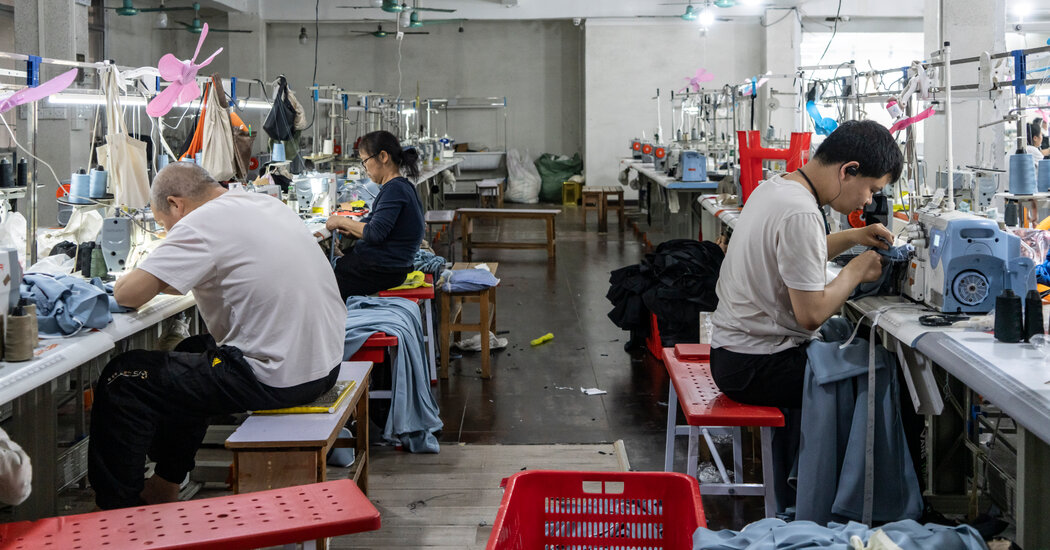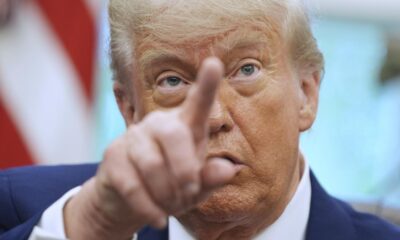Breaking News
Trump Ends Chinese Tariff Loophole, Raising the Cost of Online Goods

The Trump administration officially closed a loophole on Friday that allowed American shoppers to purchase inexpensive goods from China without paying tariffs. This move is expected to benefit U.S. manufacturers who have been struggling to compete with low-cost Chinese products. However, it has already led to higher prices for American online shoppers.
The loophole, known as the de minimis rule, permitted products valued up to $800 to enter the U.S. without tariffs or other restrictions if they were shipped directly to consumers or small businesses. This resulted in a significant increase in individual packages being sent to the U.S., many of which were shipped by air and ordered from popular e-commerce platforms like Shein and Temu.
Many companies took advantage of this loophole to avoid tariffs on Chinese goods, especially after President Trump imposed tariffs on such products. The use of the loophole intensified during his second term when tariffs on Chinese goods reached as high as 145 percent.
In 2023, U.S. Customs and Border Protection processed over a billion packages through this loophole, with an average value of $54.
During a cabinet meeting at the White House, President Trump referred to the loophole as “a scam.”
He stated, “It’s a big scam against our country, particularly small businesses. We have put an end to it.”
The decision to eliminate the loophole was partially driven by concerns about its misuse as a channel for fentanyl trafficking into the U.S.
The administration highlighted that drug traffickers were exploiting the loophole to smuggle precursor chemicals and other materials for manufacturing fentanyl without providing necessary shipping information.
The increasing use of the loophole posed a threat to U.S. jobs in warehousing and logistics. It encouraged major retailers to ship products directly from China to consumers’ homes, bypassing tariffs on larger shipments that went through U.S. warehouses and delivery networks.
Kim Glas, president of the National Council of Textile Organizations, stated that the loophole had severely impacted the U.S. textile industry. She mentioned that it allowed unsafe and illegal products to flood the U.S. market duty-free for years, with over half of de minimis shipments containing textile and apparel products.
Opponents argued that ending the exemption would raise prices for consumers, harm small businesses reliant on the loophole, and disrupt trade flow between countries. The changes, effective for shipments from mainland China and Hong Kong, are expected to cause confusion and challenges for consumers and retailers.
Online retailers like Temu and Shein have already started adjusting to the change by listing import charges or including tariffs in their prices to reflect the new regulations.
Analysts predict that the elimination of the loophole will impact Chinese exports and force online retailers offering low prices to raise their prices significantly, causing a “price shock” for American consumers.
The Trump administration plans to eliminate similar loopholes for shipments from other countries but is strategizing on how to collect fees efficiently. The initial attempt to turn off the de minimis exception for China in February overwhelmed shipment channels, prompting a temporary reversal to address logistical challenges.
The de minimis exception was established in the 1930s to simplify tariff collection for low-value goods. Over the years, the threshold was raised to $800 in 2016, but pressure to eliminate the loophole has been mounting.
Lawmakers and the Biden administration have proposed reforms to narrow the exception, particularly concerning China. One concern is the disparity in tariffs between goods shipped through the Postal Service and private carriers like DHL or FedEx.
While goods from China via private carriers face tariffs of at least 145 percent, those through the Postal Service incur lower tariffs or fixed fees. This discrepancy could lead to potential loopholes for bypassing tariffs on Chinese goods.
The Postal Service may face less scrutiny in collecting tariffs on goods shipped from China through foreign postal services, creating opportunities to circumvent tariffs on Chinese products.
While the de minimis exception remains for countries other than China, goods made in China are no longer eligible for this exemption. Private carriers are mandated to collect origin information to ensure tariffs are paid for Chinese-made goods routed through other countries.
The Postal Service and foreign postal services are not currently required to provide origin information, potentially leading to schemes to evade China tariffs using postal routes.
Peter Eavis and Julie Creswell contributed to this report.
-

 Destination9 months ago
Destination9 months agoSingapore Airlines CEO set to join board of Air India, BA News, BA
-

 Breaking News10 months ago
Breaking News10 months agoCroatia to reintroduce compulsory military draft as regional tensions soar
-

 Gadgets4 months ago
Gadgets4 months agoSupernatural Season 16 Revival News, Cast, Plot and Release Date
-

 Tech News1 year ago
Tech News1 year agoBangladeshi police agents accused of selling citizens’ personal information on Telegram
-

 Productivity12 months ago
Productivity12 months agoHow Your Contact Center Can Become A Customer Engagement Center
-

 Gadgets1 month ago
Gadgets1 month agoFallout Season 2 Potential Release Date, Cast, Plot and News
-

 Breaking News10 months ago
Breaking News10 months agoBangladesh crisis: Refaat Ahmed sworn in as Bangladesh’s new chief justice
-

 Toys1 year ago
Toys1 year ago15 of the Best Trike & Tricycles Mums Recommend























